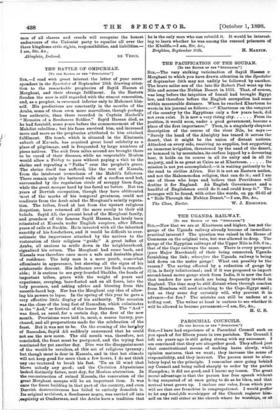THE BATTLE OF OMDURMAN.
[To THY EDITOR or THE "SPUTATOB."] SIR,—I read with great interest the letter of your corre- spondent in the Spectat,- of September 24th drawing atten- tion to the remarkable prophecies of Sayid Hassan el Morghani, and their strange fulfilment. In the Eastern Soudan the seer is still regarded with the utmost veneration, and, as a prophet. is esteemed inferior only to Mahomet him- self. His predictions are constantly in the mouths of the Arabs, some of them even more marvellous, though perhaps less authentic, than those recorded in Captain Machell's "Memoirs of a Soudanese Soldier." Sayid Hassan died, as he had foretold, some years before the commencement of the Mandist rebellion ; but his fame survived him, and increased more and more as the prophecies attributed to him attained fulfilment. His tomb, which is situated in the Khatmeia suburb of Kassala, has acquired great local celebrity as a place of pilgrimage, and is frequented by large numbers of pious natives. The sick from miles around are brought there to be cured of their diseases, while no respectable Moslem would allow a Friday to pass without paying a visit to the shrine and repeating a " Fatha" over the prophet's grave. The shrine itself has suffered, like the rest of Kassala, from the intolerant iconoclasm of the Mandi's followers. There remain only tba battered walls of a roofless mud hut, surrounded by tha regulation circle of scrappy linen flags, while the great mosque hard by has fared no better. But ten years of Dervish occupation, though they have obliterated most of the marks of his temporal greatness, could not eradicate from the Arab mind the Morghani's saintly reputa- tion. The tribes, freed at last from the upstart religious despotism, have returned all the more surely to their old beliefs. Sayid Ali, the present head of the Morghani family, and grandson of the famous Sayid Hassan, has lately been reinstated at Kassala under English auspices, after fifteen years of exile at Suakin. He is invested with all the inherited sanctity of his forefathers, and it would be difficult to over- estimate the importance attached by the natives to the restoration of their religions " guide." A great influx of Arabs, all anxious to settle down in the neighbourhood, signalised his return. The Morghani had come back, and Kassala was therefore once more a safe and desirable place of residence. The holy man is a mere youth, somewhat effeminate in appearance, but showing all the signs of his aristocratic descent. His influence over his flock is remark- able; it is curious to see grey-bearded Sheikhs, the heads of important tribes, grave with the weight of years and experience, creeping, bare-footed and on all fours, into the holy presence, and asking advice and blessing from this smooth-faced boy. Nor has the Morghani any idea of allow- ing his powers to lapse. In the spring of this year he gave a very effective little display of his authority. The occasion was the close of the long fast of Ramadan, which culminates in the "Aed," or festival of the lesser Bairam. The "Aed" was fixed, as usual, for a certain day, the first of the new month. Provisions were laid in, meat, a scarce luxury, pur- chased, and all preparations made for the celebration of the feast. But it was not to be. On the evening of the lastilay of Ramadan, Sayid Ali suddenly announced that he could not see the new moon. The old month was, therefore, not concluded, the feast must be postponed, and the trying fast continued for yet another day. Dire was the disappointment of the would-be revellers, at this act of religious tyranny ; but though meat is dear in Kassala, and in that hot climate will not keep good for more than a few hours, I do not think any one ventured to break his fast. 'Tis an ill wind that blows nobody any good ; and the Christian Abyssinians looked distinctly fatter, next day, for Moslem abstention. In the reconstruction of ruined Kassala, the renovation of the great Morghani mosque will be an important item. It was once the finest building in that part of the country, and even Dervish destructiveness has failed to entirely demolish it. Its original architect, a Soudanese negro, was carried off into /captivity at Omdurman, and the Arabs have a tradition that
he is the only man who can rebuild it. It would be interest- ing to learn whether he was among the rescued prisoners of the Khalifa.—I am, Sir, &c.,






































 Previous page
Previous page